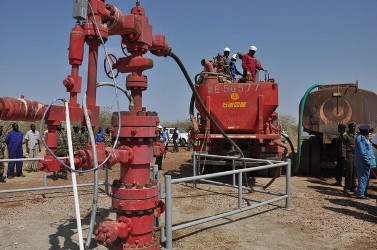S. Sudan’s Pagan dismisses SPLM-DC’s claims of “raw” oil deal
By Julius N. Uma
August 9, 2012 (JUBA) – South Sudan’s chief negotiator, Pagan Amum, has dismissed claims from the opposition SPLM-DC that the country got a raw deal from the recent oil agreement it reached with Sudan, under the mediation of the African Union High Level Implementation Panel (AUHIP).
 SPLM-DC, in a statement issued on Thursday, described the newly agreed upon fees for the transportation of South Sudan’s oil through Sudan for export were reached due to “poor” negotiations between the two parties, and were not conducted in the interest of citizens from both countries.
SPLM-DC, in a statement issued on Thursday, described the newly agreed upon fees for the transportation of South Sudan’s oil through Sudan for export were reached due to “poor” negotiations between the two parties, and were not conducted in the interest of citizens from both countries.
“This is the SPLM [Sudan People Liberation Movement] government and it is the SPLM that is responsible for governing the country, including handling all the aspect of the negotiations. This is our government,” he told Sudan Tribune.
The lead negotiator also accused the SPLM-DC leader, Lam Akol of conniving with the Khartoum regime to destabilise South Sudan.
“SPLM-DC has no business with this [negotiations]. They are saying all these when their chairperson is Khartoum conniving against the people of South Sudan. They should be silent and not even open their mouth. What have they done for the people of South Sudan?” he asked.
The opposition party, in the statement extended to Sudan Tribune, anticipates that the oil fees could rise sharply in real terms, contrary to what the negotiating teams say.
The press release, dated 9 August, alleges that Khartoum is likely to get $40 per barrel of oil, instead of the $36 per barrel they initially proposed.
“See how generous our negotiating team was. This amount excludes the cost of cleanup and recovery of oil wells which experts estimate would cost not less than $20 billion,” the SPLM-DC statement reads in part.
But Amum, who is also the SPLM’s Secretary General, defended the oil deal arguing that it is in the interest of the citizens of South Sudan, based on internationally agreed upon commercial rates.
“The Government of Sudan was demanding pipeline tariffs and terminal fees of $25, but under the deal, RSS [Republic of South Sudan] will be paying $8.4 and $6.5 for GNPOC and Petrodar respectively”, he added.
Petrodar transports oil from Block 3 and 7, which produce around 80 percent of South Sudan’s oil.
The new fees, he added, will only last over a three and half year period, after which the two countries can still enter into negotiations for lower rates, if South Sudan still wants to continue transporting its oil through Khartoum.
(ST)
